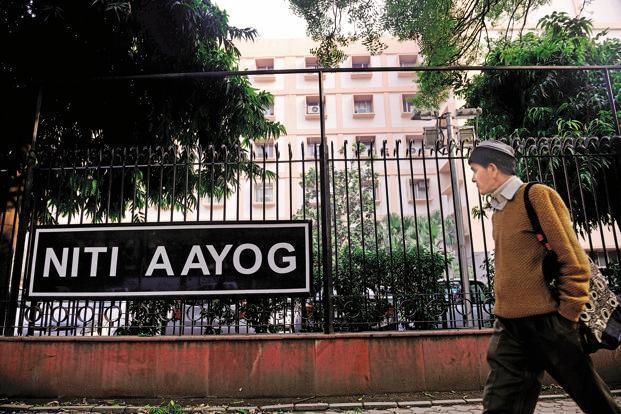Niti Ayog Undermines Federalism

Image Courtesy: Daily Rounds
In January 2015, the central government had announced its decision to scrap the Planning Commission and replace it with NITI ayog. With this decision, the role that Planning Commission played in allocating resources to the states, keeping in mind the regional disparities, has come to an end. NITI Aayog, which replaced the planning commission, is established with a regressive mandate to take India further down the path of free markets, privatisation and dilution of social welfare policies.
It cannot be denied that the erstwhile Planning Commission was an instrument in the hands of the Central Government, with the states having no say in the resource allocation. However, Modi’s claim that the new set-up would be based on cooperative federalism* with the states as stake-holders has turned out to be a spurious. The National Development Council, to which the Planning Commission reported, though not a statutory body, was a forum where state chief ministers expressed themselves, not just on issues affecting their own states but also on development issues at national level. At these meetings, the states could also exert some pressure on the centre to accommodate some of their demands. But, no such mechanism exists in NITI Aaayog.
In January 2016, a year after the dismantling of the Planning Commission, the Central Government announced that it wished to completely replace the National Development Council by the Governing Council of NITI Aayog, which is a powerless body, designed to work like a think-tank. The governing council is directly under the control of the Prime Minister and the Prime Minister's Office -Making it in essence a centralised unitarian structure.
Moreover, since allocations to the states are now being decided by the Finance Ministry, the states are subject to the political whims of the Central government. By saying "one size does not fit all" what Modi government has done is to put states at the mercy of the Centre, to be dealt with arbitrarily, without any common principles and norms. This has opened new doors for political bargaining and deal making.
Underlying the abolition of the concept of the Planning Commission, was Modi Government's ideological conviction that public resources should be put at the disposal of the private sector and the market forces. With this, the role of the State in ensuring the citizens their fundamental rights and fulfilling the Directive Principles of the Constitution regarding education, health, food security and livelihood, has been abandoned.
These centralising measures constitute an essential element of the neo-liberal strategy, and were being introduced by the previous UPA government as well. But the present NDA government, with its unquestioned loyalty to the corporate-financial oligarchy, which had financed BJP government’s path to power, is pursuing this agenda with a relentlessness that is quite unprecedented. Neo-liberalism requires centralisation of power and resources in the hands of a union government that is sympathetic to corporate interests. States, devoid of resources, will then be forced to court private corporations as the only possible means of bringing about investment and growth in their regions. Neo-liberalism wants in short, a destruction of any authentic federalism that allows leeway to states for pursuing divergent development strategies, including strategies that do not strictly conform to the demands of the corporate-financial oligarchy. The abolition of the Planning Commission and the National Development Council are in line with this neo-liberal agenda.
This attempt at the complete destruction of our federal structure has come to the fore, more visibly, with the recent Niti Aayog’s ‘instruction’ to collectors.
After dismantling of the Planning Commission, as a substitute to the five-year plan, Central Government is coming up with a 15year vision document comprising of 3 year action agenda and a 7 year strategy document. In this context Niti Ayog’s chief executive officer, Amitabh Kant sent a letter directly to all the district collectors requesting them to prepare a one page document listing the suggestions and priorities of the citizens from every grama sabha. This document is to be forwarded to NITI Ayog by January 31, after convening a ‘special grama sabha’ on January 26. The letter to the collectors also says that ‘Once collated, the national priorities will be taken into serious consideration in drafting India's vision document and shall also be presented as Citizen's Vision of India to the Prime Minister’.
No communication in this regard has been made to the State Governments and the letter has been directly sent to the district collectors. This is the second instance in which the Niti Aayog has directly given instructions to the district collectors. The earlier one was with regarding the steps to be taken to reduce the hardships of the public pertaining to the demonetisation issue. It is alarming that the Niti Aayog is operating an informal WhatsApp group meant for the Digital India initiative, in which only the Niti Aayog officials and the district collectors are the members. Not only is the bypassing of the State Governments unconstitutional, the district collectors are in no way empowered to convene a grama sabha meeting. According to the Panchayati Raj Act, the power to convene grama sabhas rest with the respective local bodies. Therefore, it is both unconstitutional as well as against the spirit of federalism.
If at all the Prime Minister was serious about formulating a Citizen’s Vision of India, it would have been appropriate to convene a meeting of the Inter-State Council to draft it. It would have ensured that the citizens’ voices from all across the country are recorded. Considering the fact that this is the second instance where the State Governments have been bypassed by the NITI Aayog, it is clear that this is a deliberate and planned effort at dismantling the federal structure of our country. India is a country of several nationalities, it is imperative that the federal structure of our country is upheld, to ensure that the spirit of equality, brotherhood and justice as envisaged in our constitution, prevails. The moves of central government and Niti Ayog, would deal a body blow to the unity and diversity of our country. Yet, no strong opposition to such dubious measures by the Central Government, has been expressed and that is disturbing, to put it mildly.
*It is said that the Prime Minister kept quiet when the Tripura Chief Minister, Manik Sarkar asked him what he meant by Cooperative Federalism. One is not sure, if the Prime Minister was hinting that Cooperative Federalism means to keep quiet.
Disclaimer: The views expressed here are the author's personal views, and do not necessarily represent the views of Newsclick.
Get the latest reports & analysis with people's perspective on Protests, movements & deep analytical videos, discussions of the current affairs in your Telegram app. Subscribe to NewsClick's Telegram channel & get Real-Time updates on stories, as they get published on our website.























